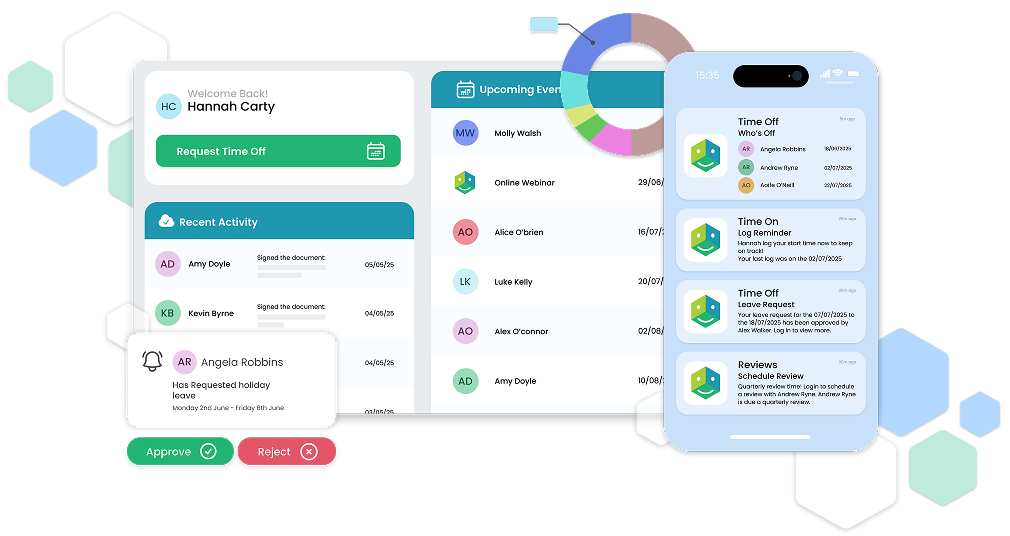As you’d expect, there are variations between jurisdiction and sectors, but generally, the answers are:
- If the results of screening checks, either positive or negative, can be reflected in the person conducting the role you are filling, then you can require checks before you hire and include them as a reference check before offering a contract. That’s a reasonable practice.
- If you want to check on people already working with you, that’s a different issue. The answer: it would be best practice to officially inform them. (A company-wide document distribution and an electronic signature tool are ideal).
But, beware of creating a negative-culture vibe. However, if checks are a genuine business requirement, such as to meet compliance or are standard in your industry, or come at the request of a vital client for example, then no problem. In this case, as well as document distribution, you should explain the reason in a town hall-style address to the team, after which you should be fine.
Why Do Employers Check Applicants’ Credit History
- Positions that involve finance and banking are under separate regulation and compliance. Such as the UK’s Financial Conduct Authority (FCA),
- To gauge the trustworthiness of staff that will be trusted with handling cash or with responsibility for spend or buying. A poor credit rating could arguably indicate they have limited ability to be entrusted with managing budgets. Many firms cite the prevention of theft and reducing liability as reasons to request permission to run checks
- Security (especially National Security) roles need a higher degree of background checks that, in some states may well involve creditworthiness too. For example, many checks for clearance levels such as the UK’s Security Vetting Services Baseline Personnel Security Standard (BPSS), CTC (Counter Terrorism Check) or Defence Business Services National Security Vetting (DBS NSV) can involve credit screening
It’s important to bear in mind that, outside of regulatory situations, if there’s room to individually judge situations you might appreciate that poor credit scores may not necessarily be the fault of an individual (E.g., poor scores due to an acquired address, as a result of a past or present partner or in a divorce situation etc.).
It’s also advisable then to consider if the check is discriminatory in this respect. In fact, in the US many states do see credit screening as a form of discrimination.
Employers also use legislation to not offer positions to those not already in jobs as many unemployed people do not have the same credit profile as those in work. So offering jobs only to those already in relevant roles is a loophole often used.
Whatever your situation, you should always check with full consent and be aware of when where and how to publish separate requests for full consent and when a simple checkbox on a form is or is not acceptable permission.
Pre-Employment Candidate Background Screening – Credit Referencing
HRLocker works with many HR Consultants and one question has come up several times:
Q: If we want to run credit checks on our existing and new employees, do we have to ask permission?
This type of question comes with a secondary query along the lines of if so, what’s the process for informing staff that we intend to run reports on any disqualifications or judgements against them?
A: The first question I’d ask in response is: ‘What is the business purpose?’
What Do Employers Look for in Background Checks Involving Credit Scores?
And what can they see or not? Again, this varies from country to country, but checks are most likely to be contracted to 3rd parties, often bundled with other searches, such as for criminal records, certifications, licenses etc.
Also, it’s very unlikely that they’ll see an actual score since they’re not extending any line of credit. Lenders will see an actual score or information related to the ability to pay, employers will usually see a reference listing information such as judgements, orders, liens, bankruptcy or disqualifications.
In the U.S. the difference between the 3-digit score and a report is marginal but hiring managers are looking for how much credit you have – and use -and to see if you are habitually a late payer. Whether you agree or disagree on whether this is ethically correct or fair to not separate work and personal lives to this extent, they are likely investigating to see if you are a disorganised individual or not.
A report enquiry should also not influence your ability, or ‘footprint’ your profile, to be granted credit in the future.
You should not worry about data privacy either because employer checks, despite having permission granted, also contain limited information on your details to prevent exposure to identity theft from within the organisation.
If a credit check is run it’s likely only to be in the final stages of the application/offer process. So likely other references and stages of the interview will have already been run, so the check may not have a major say on a final hiring decision. Many people are still hired despite any ‘marks’ against their credit score.
You should also be wary of using information wisely. How far back (say 7 or 10 years, depending on the jurisdiction) can you legally consider any criminal or bankruptcy information or record in your area of legislation? If in doubt, take advice from a legal specialist in your sector and geographical location.
Once again, when you explain why you run checks, it could be good practice to clarify that you will be diligent and stick to the original purpose and reasons for the checks. Explain that you’ll be considerate and confidentially hear explanations of any ‘unavoidable’ or ‘negative’ information that is out of a team member or applicants’ control.
Outline that results will be treated and interpreted sensitively and individually and remain in line with the primary reasons for credit checking.
Overall, be diligent that you are not liable for any wrongful denial of opportunity through how your checks are conducted. Consider offering the chance to reapply if requested once any concerns are addressed. Similarly, if you are applying for jobs, look into your credit and see if you can ‘right any wrongs’ before sending applications.
If you can’t reasonably justify the check, don’t run it.









